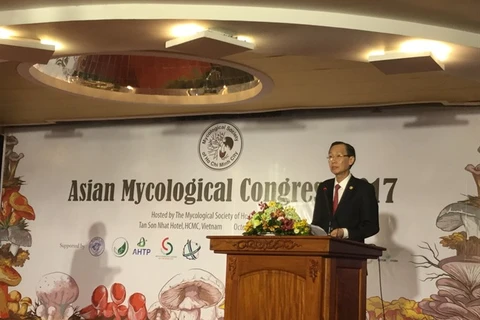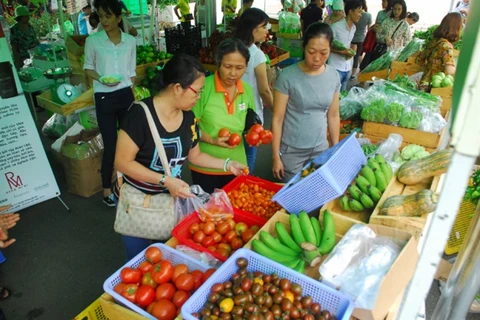 Le Cong Khanh earns 250 million VND a year from fungi. His farm also provides jobs for local people (Photo: VNA)
Le Cong Khanh earns 250 million VND a year from fungi. His farm also provides jobs for local people (Photo: VNA)Kon Tum (VNA) - Forty-three-year-old Le Ngoc Khanh from Dak Hrinh commune in the Central Highlands province of Kon Tum quit his stable job as a teacher at a vocational school and started growing mushrooms in 2014.
Being a novice in the business, Khanh enrolled in a training course to learn how to overcome the challenges. He now owns a 6,000-square-metre mushroom farm that yields tonnes each year.
In 1998, after serving in the army, Khanh married and studied at the construction college in Hanoi. After finishing his study, he returned to his hometown and worked as teacher in Dak Ha district and then a vocational training school.
“The hard training in the army helped me to acquire independence, self-discipline and become more tolerant of the challenges in life,” said Khanh.
In 2010, he visited some households expertly growing lingzhi mushrooms in Cu Chi district in HCM City. Khanh found lingzhi could bring high economic benefits and began to nurture a dream of growing them.
In 2012, he visited a lingzhi mushroom farm run by a woman in Krong A Na district in Kon Tum. Khanh then quit his job to pursue mushroom growing. Yet it was not easy. Most of his friends opposed his decision, but he was so determined that he joined a four-month course that offered knowledge and skills in growing the fungus in the Krong A Na vocational training centre.
During the course, he also travelled to other localities, including Phu Yen and Quang Nam, to learn more.
Khanh then started growing lingzhi at home. Khanh and other former soldiers also set up an agriculture, trade and service cooperative.
“The cooperative was where the soldiers exchanged knowledge on working life, offering their skills to local people. By establishing a cooperative, it is easier to call for investment from local small business,” said Khanh.
Khanh hired four workers, the children of co-op members to work on his farm. They learned and worked for a monthly income of 3.5 million VND (55 USD).
Khanh opened his first lingzhi farm in 2014, which covered 100sq.m and grew four types of mushrooms – lingzhi (Ganoderma lucidum), wood ear (Auricularia auricula-judae), oyster mushroom (Pleurotus ostreatus), and straw mushroom (Volvariella volvacea).
Initially he suffered a big loss as only 300 packages of mushrooms were of high quality to sell.
“I still persisted with the project and decided to stay on the farm to identify the reason for the failure,” said Khanh.
With patience and persistence, by late 2015, Khanh was able to sell 250kg of wood-ear mushroom for 23 million VND (1,000 USD), 150kg of lingzhi for 80 million VND (3,500 USD), and 5.6 tonnes of oyster mushrooms for 100 million VND (4,400 USD).
With more than 200 million VND (8,800 USD) from the sale of mushrooms, Khanh paid off his loans and invested in the next batch.
In 2016, things went more smoothly. Khanh made a machine to keep the mushrooms warm. He also made a mixture of chilli, garlic and lemongrass to sterilise the farm.
Early 2017, he broadened the farm to 9,000sq.m. Khanh invented almost all the farm machinery and equipment himself.
Currently, his mushrooms are distributed in several supermarkets in Kon Tum, Phu Yen, Da Nang, and HCM City.
Khanh also sells mushroom at the embryonic stage for those who want to grow mushroom by themselves - and shares his knowledge with locals in Kon Tum and Phu Yen provinces.
“Now my hard work has paid off. I am so happy. Mushrooms are such a passion,” said Khanh.
In 2016, sales of mushrooms reached 600 million VND (27,000 USD) with profit of 150 million VND (6,600 USD). In the first 10 months of this year, Khanh earned 1 billion VND (44,300 USD) in sales with profit of 250 million VND (11,000 USD).
"Khanh’s farm is an exemplary model in the commune. The local authority encourages production to expand so that it can provide more jobs for local people,” said Dang The Quyet, chairman of Dak Hrinh commune’s People’s Committee.
Nowadays, mushroom cultivation is being encouraged in Vietnam as it not only produces clean and healthy food, but creates jobs and reduces environmental pollution.-VNA
VNA





















